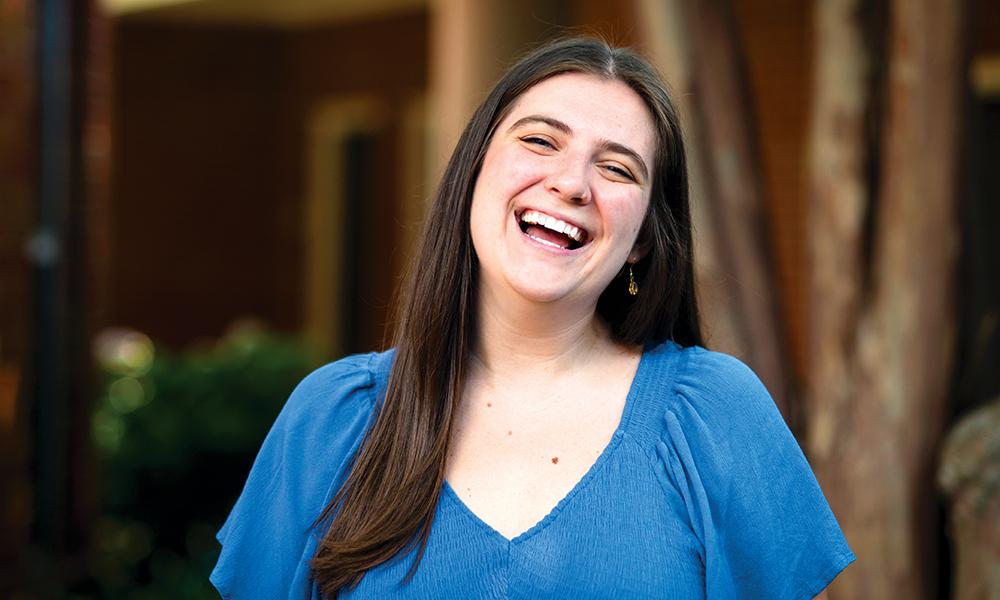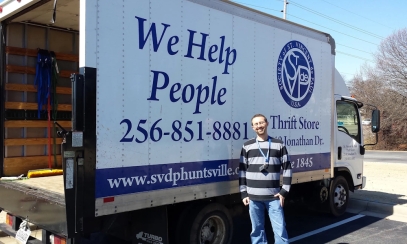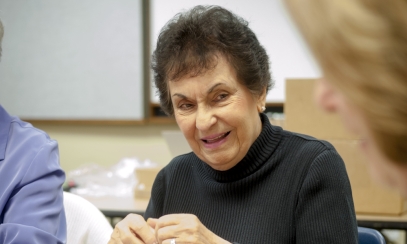
The Guiding Light of Virtue
One Young Adult’s Journey to Truth
One Young Adult’s Journey to Truth
“I've heard it said before that youth are the future of the Church,” remarks Madison Jaubert, the director of development for Bama Catholic Campus Ministry at St. Francis of Assisi University Parish in Tuscaloosa. “While this statement is true,” she concedes, “the reality is that youth are also the Church right now!”
Oftentimes, that reality is not given full consideration. Jaubert, being a young adult, can speak with conviction when asserting that “young people in the Church want and need community.” In our distracted world of social media and isolation, youth and young adults long for what is “real and true.”
“I've heard it said before that youth are the future of the Church,” remarks Madison Jaubert, the director of development for Bama Catholic Campus Ministry at St. Francis of Assisi University Parish in Tuscaloosa. “While this statement is true,” she concedes, “the reality is that youth are also the Church right now!”
Oftentimes, that reality is not given full consideration. Jaubert, being a young adult, can speak with conviction when asserting that “young people in the Church want and need community.” In our distracted world of social media and isolation, youth and young adults long for what is “real and true.”
Growing up in Tennessee as a non-Catholic, Jaubert was very active in her church’s youth group. She was also blessed with the example of her father, who not only was prayerful but also evangelized “with his actions as well as his words.” Like most children, she followed the example of her parents, yearning for their approval.
“You get to a point, though,” she says, “where you don’t really care about what your parents think.” By the time Jaubert began her freshman year at the University of Alabama in Tuscaloosa, her parents had taken a “back seat” to her friends.
Following the lead of other women in her new sorority, Jaubert put all her efforts into the “college experience.” Late nights of drinking led to mornings of shame and embarrassment, but she admits, “I did a lot of comparing.” Looking to someone else engaging in “far worse” behavior helped her rationalize her actions. The justifying helped, of course, yet there was an “unrest” and “sadness” in her heart.
Making matters worse was the immense pressure to present a certain image on social media. “It’s like you are always on stage. It’s not even about being better than everyone. ... It’s about keeping up and presenting this life that looks fun.”
As Jaubert continued to navigate the “college experience,” a young Catholic man from a mutual group of friends invited her to Mass and a meal at St. Francis of Assisi University Parish. From there, she went on to meet Catherine Wentworth, who “transformed” Jaubert’s life.
The two took a class together and built a friendship. On one occasion, Wentworth invited Jaubert over to cut her hair. It was during this seemingly ordinary visit that Jaubert had an extraordinary experience — one that was far more profound than hangovers and clever Instagram captions.
“You have to listen to this,” exclaimed Wentworth. She had just gotten back from a FOCUS (Fellowship of Catholic University Students) conference and wanted Jaubert to listen to one of the talks.
“I had never encountered someone doing that — somebody trying to share her faith,” she says frankly. “It’s not even like she was trying to share her faith. It was so real. ... It was just who she was shining through.”
As the friendship grew, so did Jaubert’s number of Catholic friends. Her newfound friends were frequent daily Mass-goers, quietly and constantly witnessing to their faith. They never condemned her, but she contends that their “virtue” highlighted her “vice.” There were times when she would feel embarrassed about how she was living her life because her friends were clearly more happy and joyful living theirs. The juxtaposition between other friends and her new group of friends was crystal clear: One group exuded an emptiness rooted in a hunger for something, and the other group’s hunger had been satiated by Someone.
“I had friends,” Jaubert remembers, “who thought they loved me because we would say that we cared about each other, but we didn’t know what it was to really love. We didn’t know that to love is to will the good, and the greatest good is Heaven.” If the greatest good for some means fleeting pleasure and happiness such as drinking and feeling miserable the next morning, then she says there’s a disconnect. In contrast, her Catholic friends would simply say, “I don’t want that for you.” They wanted more for her. The nudge in the right direction didn’t always feel good, but it was powerful. “I was encountering these people who had known me less but loved me more because they knew the person of Jesus Christ.”
Knowing the person of Jesus Christ is “really difficult to find and a harder thing to do,” she insists. Even after becoming Catholic in 2016 and working at St. Francis for the last five years, she admits that she recently found herself sobbing in the chapel, wondering if she had ever truly encountered Him. After a gentleman asked if she was OK and suggested praying for the Blessed Mother’s intercession, she recounted the chance meeting to her then fiancé, Blake Jaubert. He helped her recognize the encounter was one of many where she was actually encountering the Lord. “He helped me remember the incredible ways that the Holy Spirit has moved in my life, the things I wouldn’t have been able to do without God’s grace, and the times the Lord has really consoled me in prayer.”
Jaubert contends youth and young adults need what her family and friends provided her: a bedrock of love which supports true encounter, yielding a relationship with Jesus. “A great blessing I had in college,” she explains, “was finding friends whose values aligned with what my well-formed conscience already knew. [Those relationships] really unlocked a new freedom in me to pursue holiness and what I knew was right, instead of simply pleasure.”
Young people are often underestimated and segmented, but like all people, they are searching for truth. Sadly, society’s truth is not reality.
So, what is Jaubert’s advice to the future and present of our Church?
“Your desire is going to start changing your beliefs more easily than your beliefs can change your actions,” she contends. In other words, the way we live our lives matters. “Go to daily Mass, spend time in prayer, and be open to Him changing your heart. ... With the people you love, it’s like a grind building a relationship, so why not with Jesus? It’s like prayer. It’s a choice to talk to Him, recognizing the way He’s working in your life. … That comes from the practice of gratitude, the practice of meditating on the present, and knowing God is present.
“The world is telling you what makes you exciting, but what makes you beautiful and unique is who the Lord is calling you to be. That sounds so cheesy, but if you think about it, we are searching for these things outside of ourselves. You should look for who you are in the One Who made you.”



